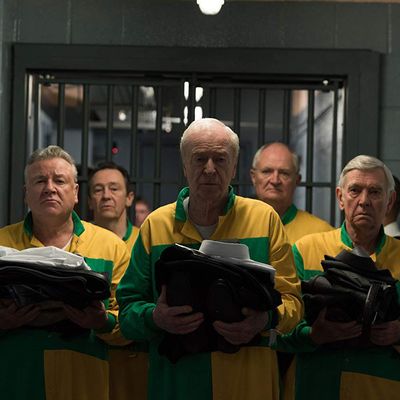
“He may seem like a sad old man, but he’s capable of severe nastiness when he’s cornered.” Someone says this about Michael Caine’s aging crook Brian Reader in King of Thieves, but it could just as easily apply to any number of Brian’s chums, played by an assortment of British screen acting legends, including Jim Broadbent, Tom Courtenay, and Ray Winstone. And the primary pleasure of James Marsh’s understated heist film is the opportunity to watch these icons go from mild-mannered pensioners to snarling, backstabbing hoods. That’s one of its shortcomings, too: We want more, and the picture never quite gives it to us. I kept wishing Marsh would just drop the not-particularly-interesting plot and let these god-level geezers go off on one another.
For a crime drama, King of Thieves initially unfolds in surprisingly casual fashion. Retired jewel thief Brian is out enjoying an evening on the town with his ailing wife (Francesca Annis), when she suddenly feels unwell and drops dead. At her funeral, he’s approached by younger crook Basil (Charlie Cox), who quietly mentions that he’s got a key to a central vault used by an assortment of jewelers in Hatton Garden, the heart of Britain’s diamond trade. Easter is coming, and the vault will be unattended. We think that Brian — whose wife had made him swear off any funny business — might be conflicted, but he eases into the role of gang leader almost unconsciously. It’s as if he knows nothing else.
The burglary in question is based on a real case — in 2015, a group of elderly veteran thieves accomplished the greatest robbery in British history — which perhaps accounts for the offhand and simple way the story develops. It’s not that Marsh doesn’t show us the particulars of the heist, or of its aftermath; it’s just that he invests it with relatively little drama. And I can only assume that an attempt to stay somewhat faithful to the facts of the case is partly what’s keeping the film from letting these characters turn truly lethal.
As a result, King of Thieves offers relatively few of the heist-movie pleasures we know and love: the elaborate planning, the team-gathering, the dogged pursuit, the spectacular unraveling, or the clean getaway. Even the robbery itself, though it has its share of challenges, is relatively undramatic. All these may seem like silly complaints — after all, genre tropes were made to be undercut — but the film spends a lot of time telling a predictable story, with only the cast there to enliven proceedings. And the actors do have fun with these men and their foulmouthed piss-taking: These crooks may struggle with insulin shots, hearing aids, incontinence, and a propensity to fall asleep on the job — but they are, in the end, crooks, and they can’t help but mock and backstab one another.
There’s also a running theme of old-school criminals failing to keep pace with technology — they banter dismissively about the internet and eBay, and poke fun at the younger Basil — as the modern-day surveillance state begins to cast a net for their capture. But again, that element is treated in cursory fashion, simply another box to check rather than an idea with which to engage. We never even get to know the cops pursuing our protagonists: We simply see flashes of them doing their jobs, as if everything’s already a foregone conclusion.
King of Thieves is certainly entertaining in spots — Michael Caine executing a robbery is never not worth watching, and Ray Winstone going full goon is always a delight — but it’s hard not to see the film as a wasted opportunity. It expends a lot of energy on a surprisingly undramatic story, when it should be having fun with its once-in-a-lifetime cast.


